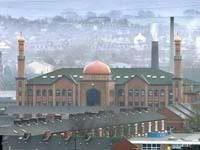
After giving her my opinion, I decided to do some of my own research. In doing so, I came across a 2005 Ofsted document containing two words which struck dread into me. See if you can guess what they are:
The specific term was introduced by Israel Zangwill's 1908 play The Melting Pot, in which David QuiIn a Year 3 religious education lesson on learning about different festivals, a notable feature was the use of a Melting Pot. Pupils had already completed work on celebrations. Part way through this lesson the teacher introduced a big jar termed a Melting Pot. It contained artefacts and props collected by the teacher during the course of six weeks which related to Islam, Judaism and Christianity as well as secular celebrations and events the pupils had been involved in, such as Arts Week.
 xano accepts the dissolution of his Jewish identity into the substrate of American identity contained by the aforementioned metaphorical vessel. It was a controversial suggestion then, and I don't think it is any less so now, as Townhall's Harry R Jackson asserts. Frighteningly, he uses the example of multiculturalism in Great Britain in general, and London in particular, to devastating effect. More frighteningly, he hits the nail on the head.
xano accepts the dissolution of his Jewish identity into the substrate of American identity contained by the aforementioned metaphorical vessel. It was a controversial suggestion then, and I don't think it is any less so now, as Townhall's Harry R Jackson asserts. Frighteningly, he uses the example of multiculturalism in Great Britain in general, and London in particular, to devastating effect. More frighteningly, he hits the nail on the head.I'm not saying that all different religions don't have a value, just that that value is different depending on whether one is thinking of a Christian, Jewish or Muslim child, or indeed a child of atheist parents.
Year 3 is Primary 4 in old money, containing children between 7-9 years old, with an average age of 8. At this time in life, I think it's a good idea to teach children that all human beings are equal regardless of their religion (or indeed lack of it), but this is a much more subtle idea than that which avers that all religions are the same. The latter concept is more a blunt instrument than a broad brushstroke, and is the mark of an atheistic outlook. As ex-PM Tony Blair's advisor Alistair Cambell famously pointed out to him, "We don't do religion". The comment was made when Blair was asked on his spiritual life by a journalist, but it could just as well have been a summary on governmental policy on religious education.
What is important in our lives does tend to be prioritised, even though other things are important to other people's lives. For example, Hannukah will start on December 22 this year, so if I am invited to a Jewish friend's house during it, I will have to see if the invitation clashes with a service in St Gallicus and work around that. The Second Vatican Council document Nostra Aetate (on the relation of the Church to non-christian religions) states hopefully:
[The Church] regards with sincere reverence those ways of conduct and of life, those precepts and teachings which, though differing in many aspects from the ones she holds and sets forth, nonetheless often reflect a ray of that Truth which enlightens all men[sic].
The elephant in the room, of course, is that the melting pot doesn't exist, even as a metaphorical
 construct. The objects of our multiculturalism (multiculturalees?) are not always multiculturalists themselves. At a time when a senior official in the Church of England is saying that more mosques need not be built because enough exist for Great Britain's (at present) 4 million Muslims - and being compared to a BNP activist by a member of the Muslim Council of Britain for her troubles - a thug has walked free from court after assaulting a vicar on the grounds that “This should not be a church. This should be a mosque.”
construct. The objects of our multiculturalism (multiculturalees?) are not always multiculturalists themselves. At a time when a senior official in the Church of England is saying that more mosques need not be built because enough exist for Great Britain's (at present) 4 million Muslims - and being compared to a BNP activist by a member of the Muslim Council of Britain for her troubles - a thug has walked free from court after assaulting a vicar on the grounds that “This should not be a church. This should be a mosque.”My own opinion, which I gave to Minora, is that state schools should give prominence to the Christian culture of Great Britain, then teach respect for other cultures, while outlining those cultures containing sizeable sectors with a mixture of hatred and acquisitiveness towards our own society.
She looked at me somewhat suspiciously - she seems to have gotten an idea from somewhere that British patriotism is not too far removed from the outlook of "far-right parties like the BNP". I nearly invited her to consider that study of the BNP's policies reveal it to be a left-wing party, but decided that was one for another day.
With Ofsted going on about melting-pots, what chance is there for children to learn the value of their own culture at school at a time in their lives when they doubt the validity of any statement from their parents more complicated than "dinner's ready"? Multiculturalists, I think, should do their homework.











No comments:
Post a Comment
Please feel free to leave a comment - Frugal Dougal.